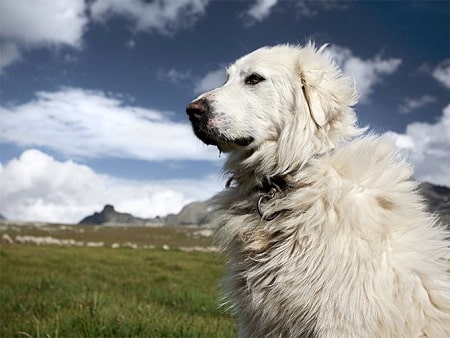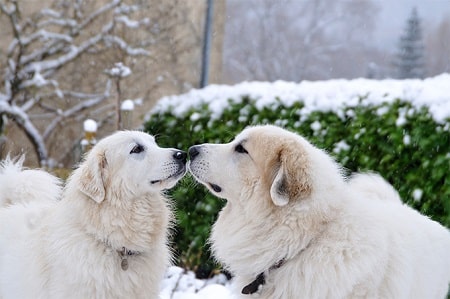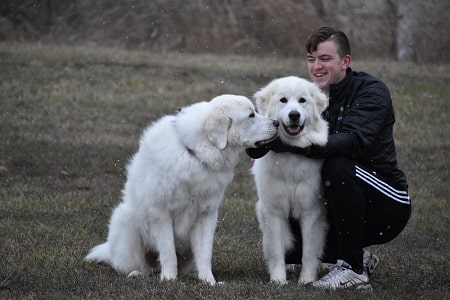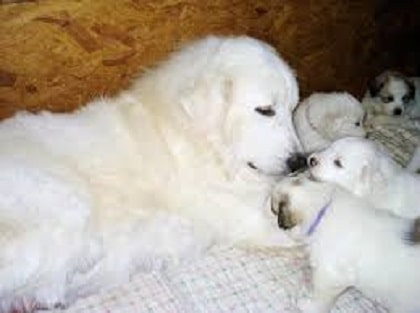Some of us, are “dombiverts”,i.e., we are selective about our doggie type. It doesn’t mean that we are not dog lovers but are really particular about which dog we would like to pet.
It is very important to know everything about your pooch before sharing the same roof with them. Thus, going only by their appearance would be a really foolish idea. One of the greatest examples is that of the Great Pyrenees Dog.
That snow white cuddly bear not just another ordinary white-haired furry dog, there’s much more to its personality. The Great Pyrenees, also known as the Mountain Dog are large sized dogs with a long body, white fur, and innocent face.
Great Pyrenees Dog Breed Overview

| Group: | Working, flock guard |
| Size: | Large (85-115pounds) |
| Lifespan: | 10-12 years |
| Best Suited For: | Families, children |
| Temperament: | Calm unless disturbed, well mannered, loyal, obedient, courageous |
| Exercise Needs: | Moderate |
| Drooling Potential: | High |
| Grooming Needs: | Moderate |
| Similar Breeds: | Akbash Dog, Maremma Sheep Dog, New Foundland, Saint Bernard |
1. Basic features:

These cuties have a large, strong built body, wedge-shaped head with a round crown with two almond-shaped brown eyes and black nose, and V-shaped ears.
They have a dense, wooly double coat which is well modified to adapt to different weather conditions. The coat comes in a variety of grey, solid white and tan accompanied by a furry tail.
The Great Pyrenees puppies appear to be furry balls which are the epitome of cuteness.
2. Origin
Dating back to the 1000 BC, these working dogs originally hail from the land of Siberia and were used to guard flocks of sheep mostly in the mighty Pyrenes Mountains.
Although they served as loyal companions to shepherds, they were also popular among the aristocracy during the 17th century.
In today’s world, the Pyrenees are widely found all over the USA and has been ranked as the 57th most popular dog in the nation.
3. Personality
Their large size and elegance add to their majestic personality. They always have a serene aura and a stoic posture. Besides being amiable, these pawed beasts are intelligible and independent creatures.
They enjoy a bit, sometimes, of their own and explore new things. Being a working dog it might become territorial. This should be kept under check.
4. Behavior

Known to be extremely faithful and protective in nature, the Great Pyrenees are well suited to become an ideal family dog. They are usually very calm unless disturbed and are very friendly with children.
These fearless dogges are mostly active at night. Don’t be surprised to see them spring up on their feet from their deepest sleep and be active. It’s time when you really need to look around your house to find something suspicious. This explains why they do not have a very welcoming attitude towards guests during the first few weeks.
5. Exercise Needs
The Great Pyrenees dogs should be trained and put to a habit of regular exercise from a tender age in order to prevent lethargy and unsocial behavior in your beloved dog.
Long brisk walks is an excellent way of keeping dog’s muscles and mental health functioning well.
Canine activities, cart pulling and other light to moderate exercises are apt for this breed of dog.
6. Diet Needs
Low protein dry dog food works best for the big dogs so this kind of food is suggested for them as they are prone to bloating. However, wet food is also essential for them just as it is for other breeds of dog. Small meals throughout the day, especially around the exercise time is recommended.
7. Trainability

One has to be really consistent and firm while training a Pyrenees dog. As they are of a solemn nature and can get a bit adamant. They should be trained by setting proper guidelines that the dog must follow in order to prevent further stubbornness.
As I had mentioned earlier, they are intelligent and independent creatures who love to go on an adventure on their own. Hence, it is advisable that you keep them in a fenced area. This is something that is especially applicable for young and active puppies who might have a tendency to wander around.
8. Health Problems
Just like we all know, wellness and sickness are like a puzzle that fit together. It is no different when it comes to our pooches. They too are vulnerable to certain health concerns like:
Elbow and Hip Dysplasia – This is a painful genetic disease in dogs which often leads to crippling as a result of abnormal formations of the hip sockets and elbow joints. This is also said to have been affected by environmental conditions.
Degenerative Myelopathy- Unlike the above-mentioned disease this isn’t quite painful for the dog but affects the gait of the dog just in the same way. This is a neurological problem in dogs caused by the mutation of a gene. The symptoms are not that prominent in the beginning since it affects the white matter tissue of the spinal cord but later it might lead to loss of muscular activity of the hind legs, forelegs and the ability to control feces and urine.
Congenital Deafness-This is a kind of deafness that is often noticed in young ones. One of the major symptoms is deafness in one ear or maybe both. The reason behind this is yet to be known but it has been found to be usually inherited.
Tests like Hip evaluation and Patella evaluation are suggested for the dogs of this breed. Thus, it is very important to take your dog to a regular visit to the vet’s clinic for a sound body and mind.
9. Who should Adopt a Great Pyrenees?

The first thing to be kept in mind before adopting a Great Pyrenees puppy is that one should approach a good, responsible breeder who gives you proper information about the lineage of the puppy in order to be aware of the health status of the puppy.
Second, one should know that a Pyrenees dog is a large one that needs space, sheds a lot of hair throughout the year and needs a firm owner to maintain and balance the lifestyle of the dog.
Hence, one should move ahead with the decision of adopting a Great Pyrenees puppy only if they are confident enough to fulfill their emotional and physical needs of the sweetheart.
